Charles E W Bean, Diaries, AWM38 3DRL 606/2/1 - January - March 1915 - Part 8
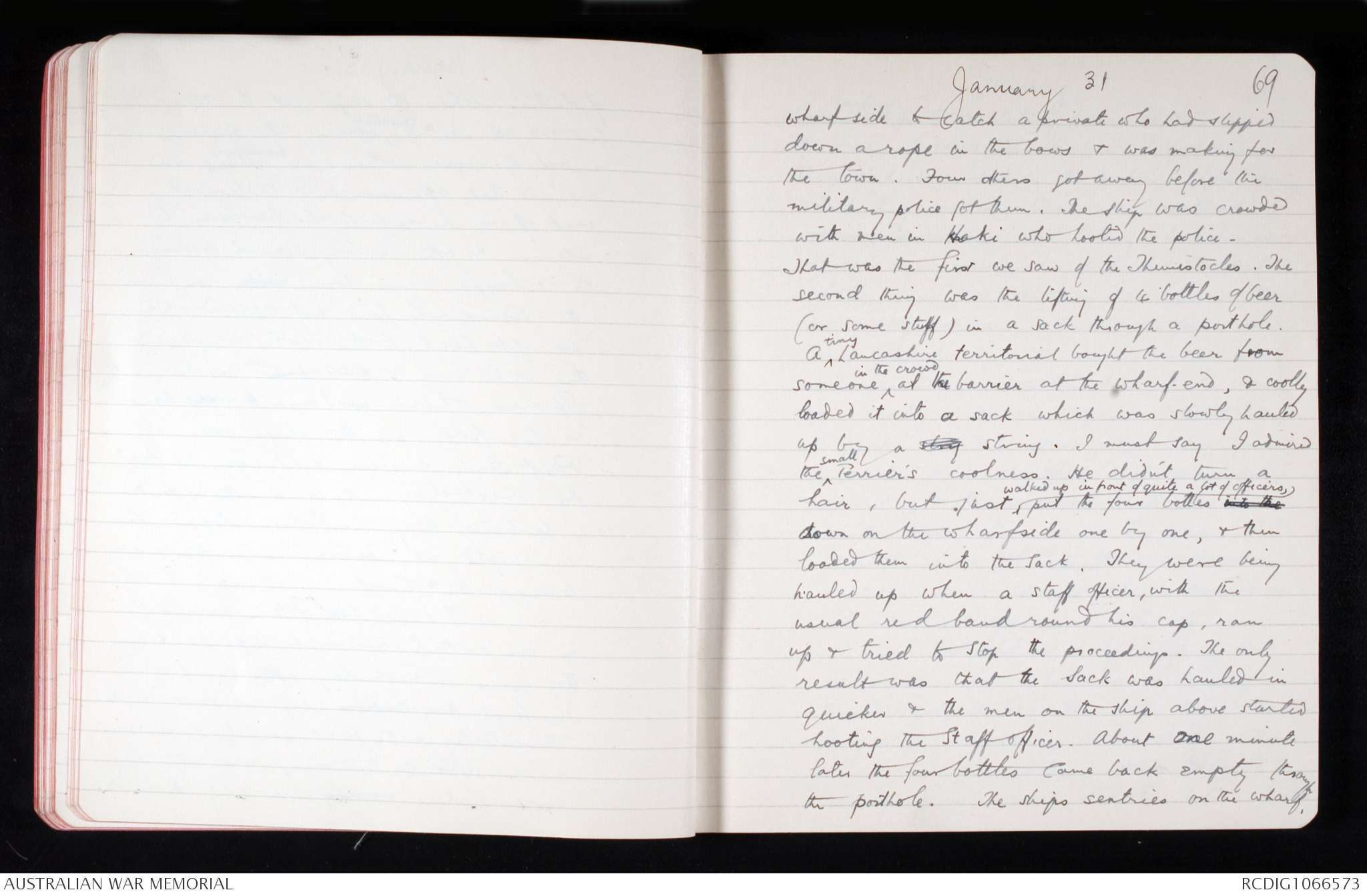
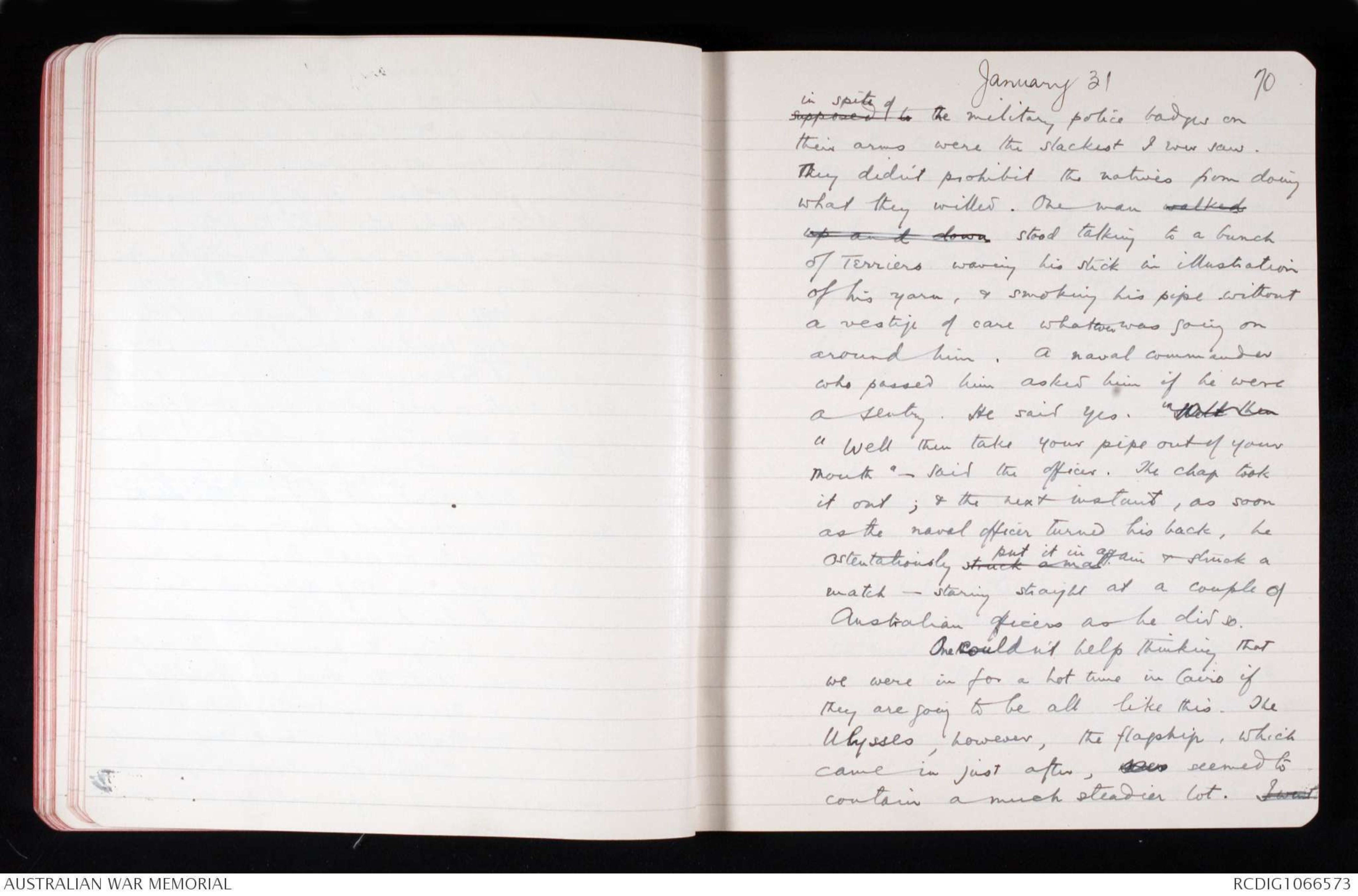
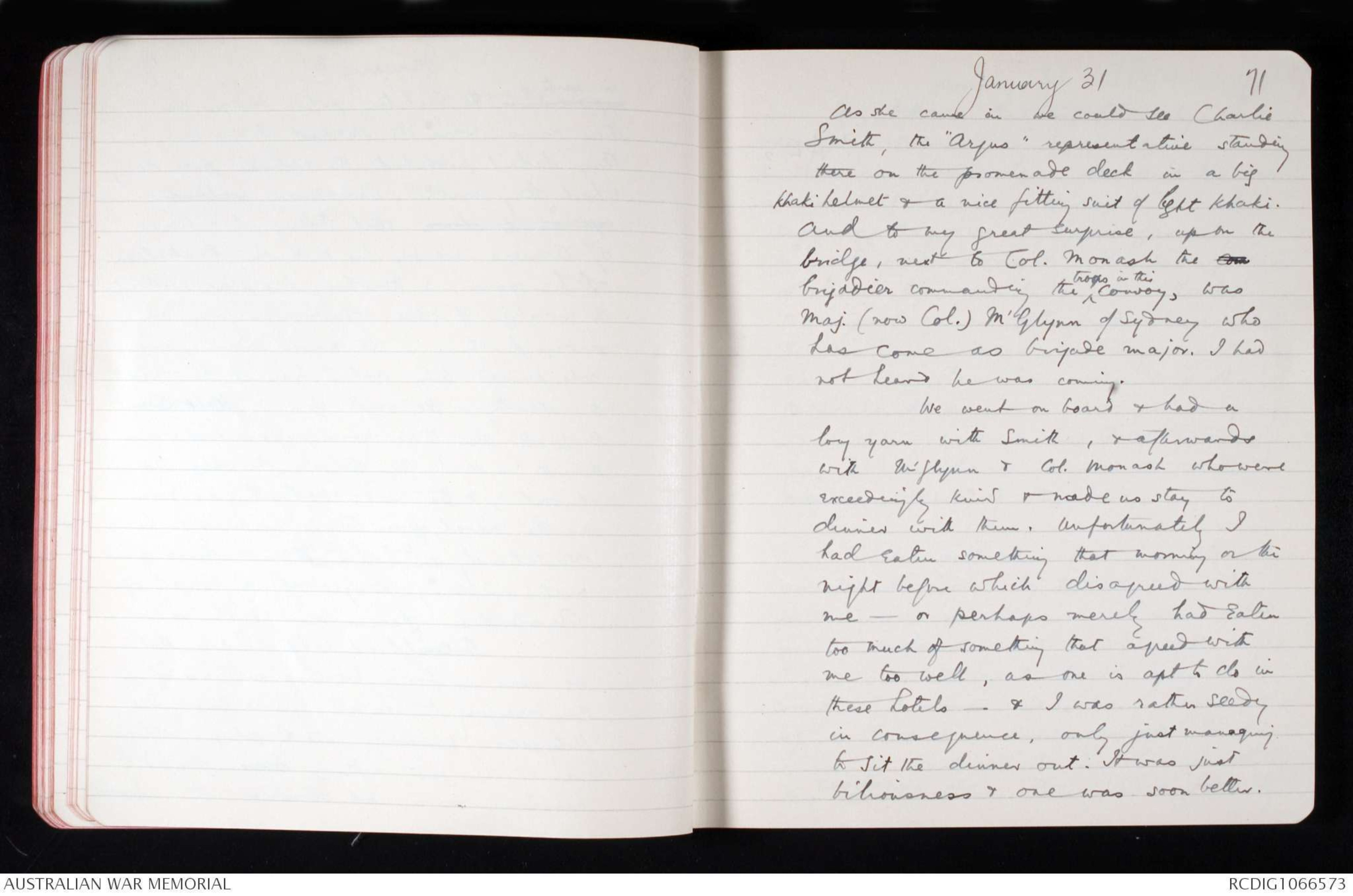
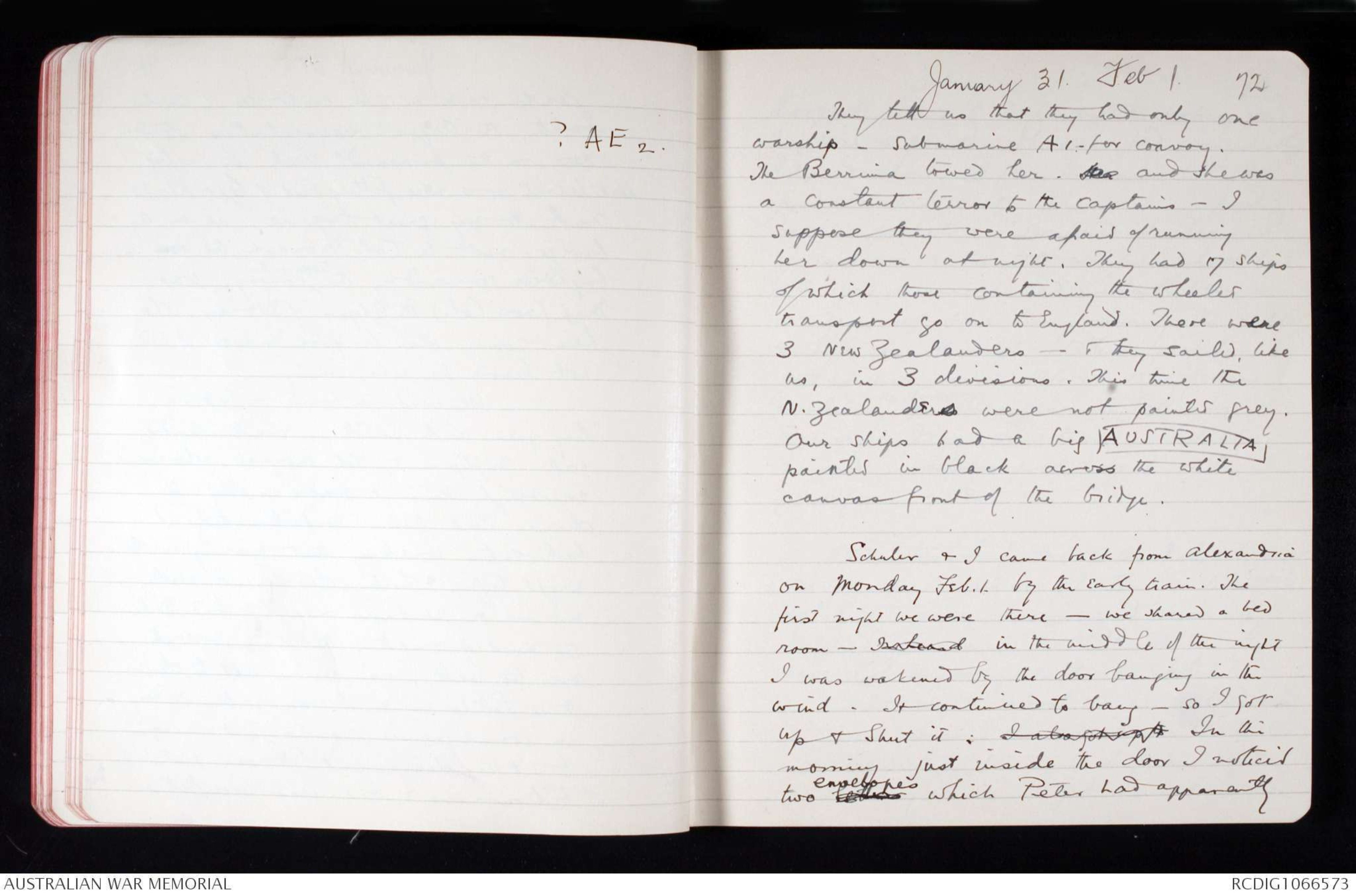
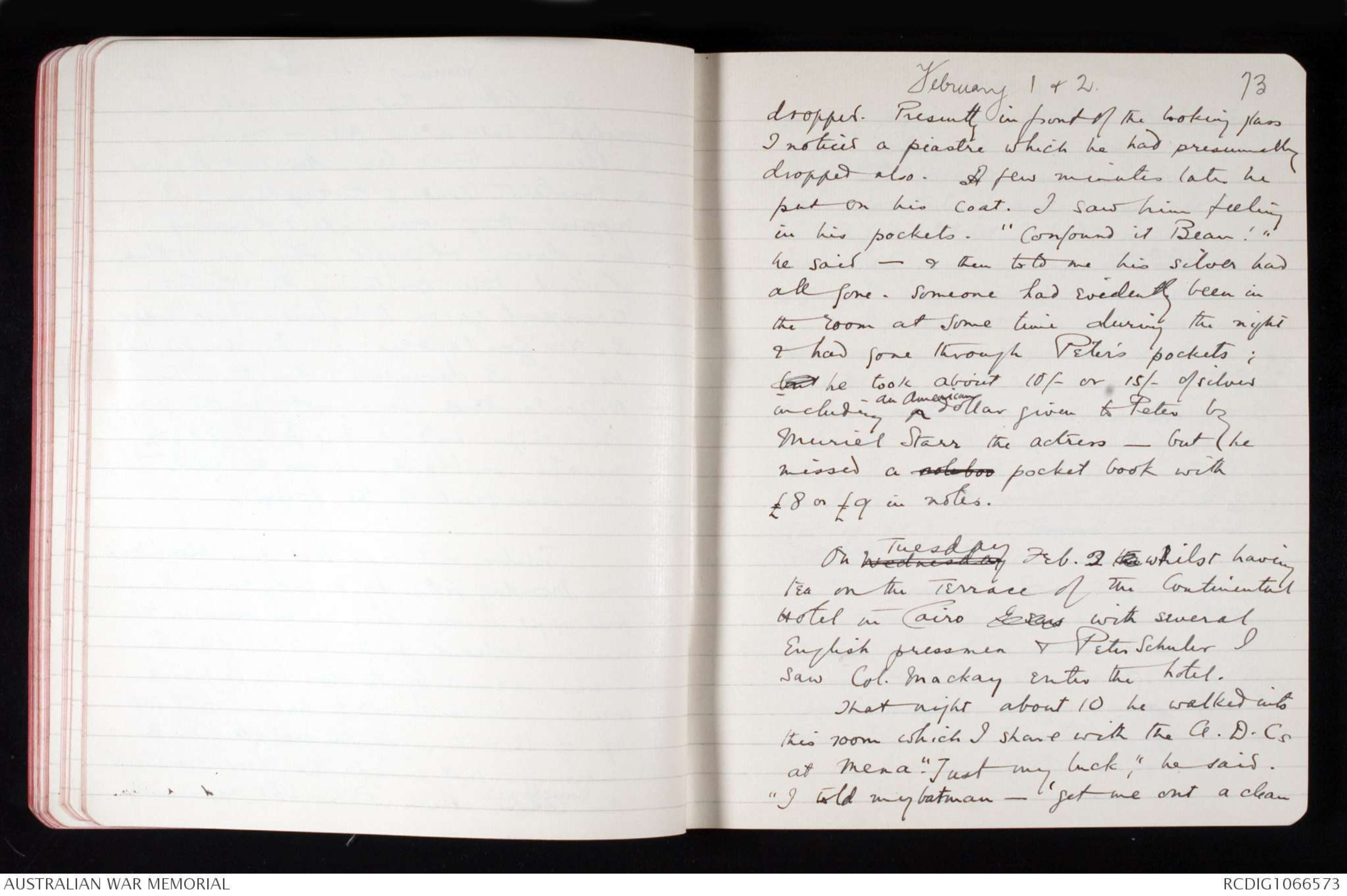
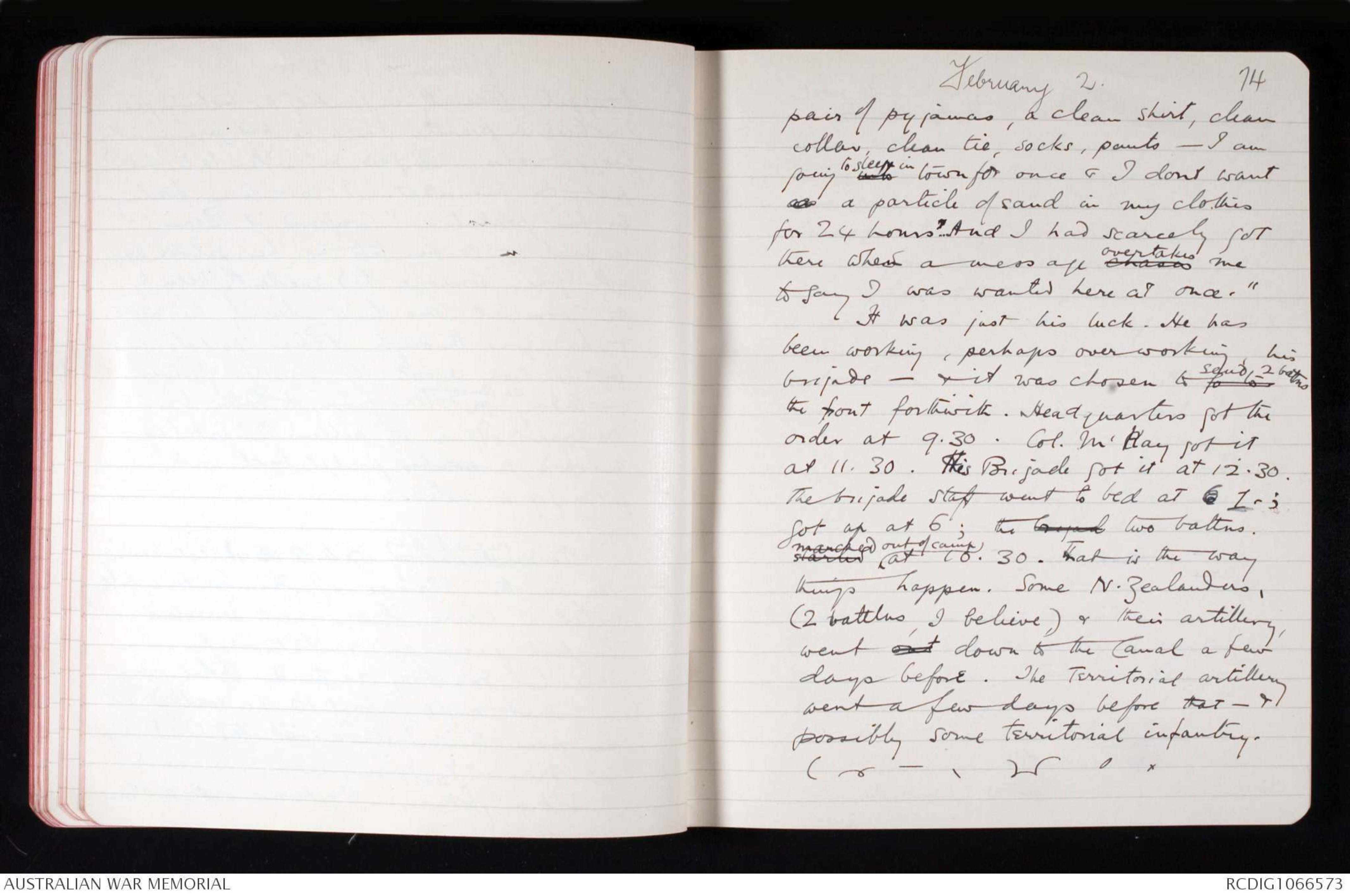
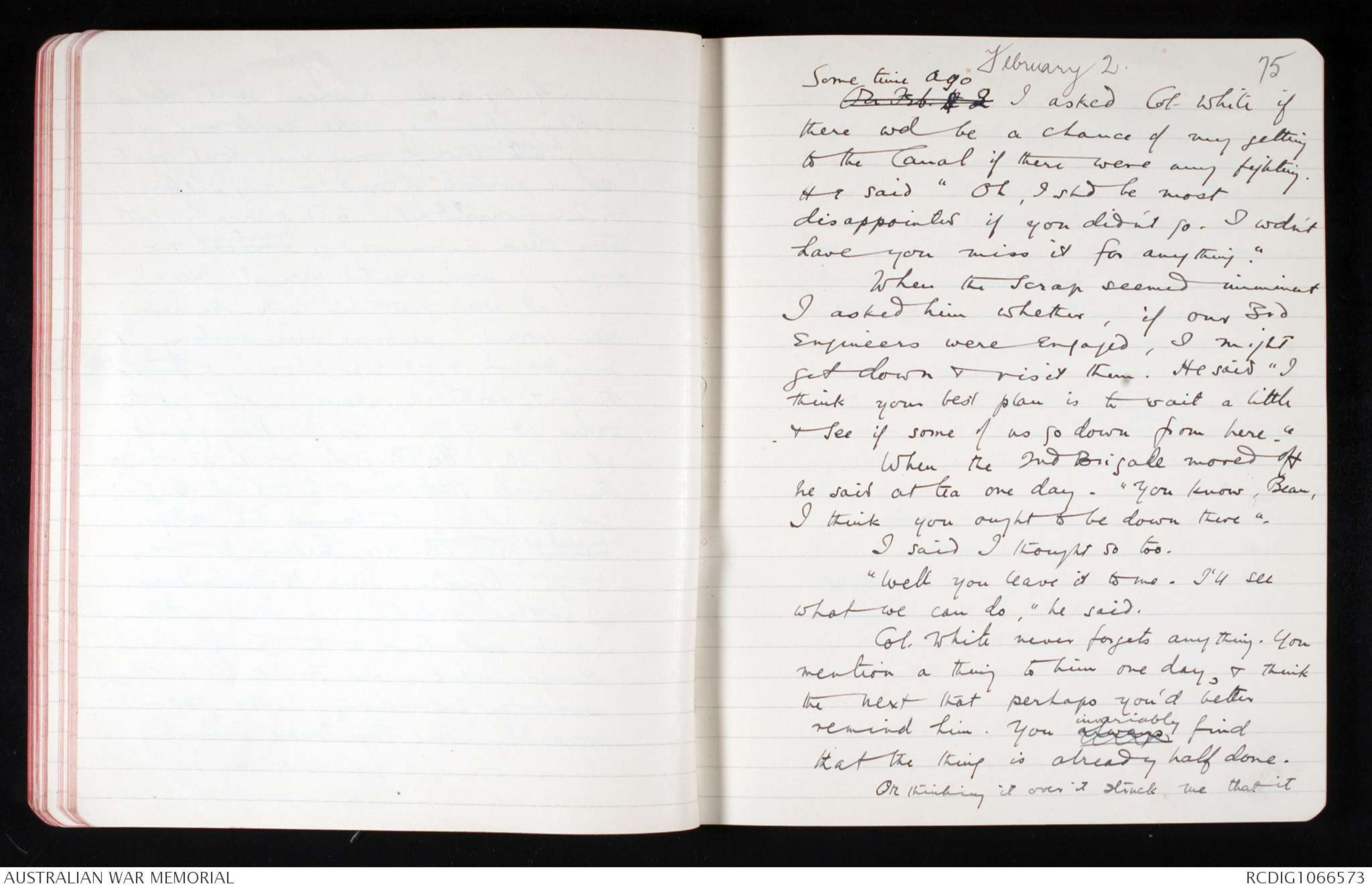
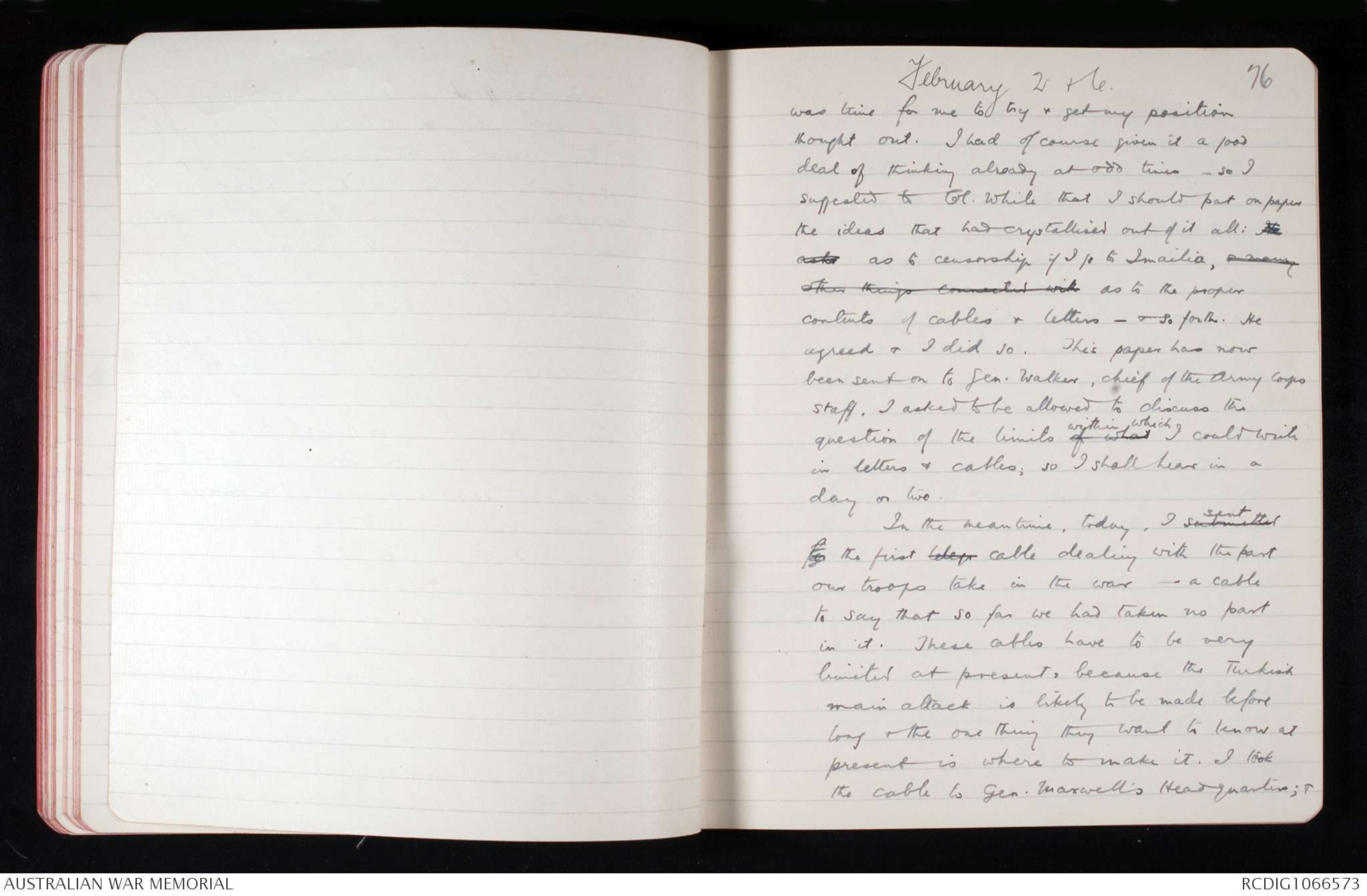
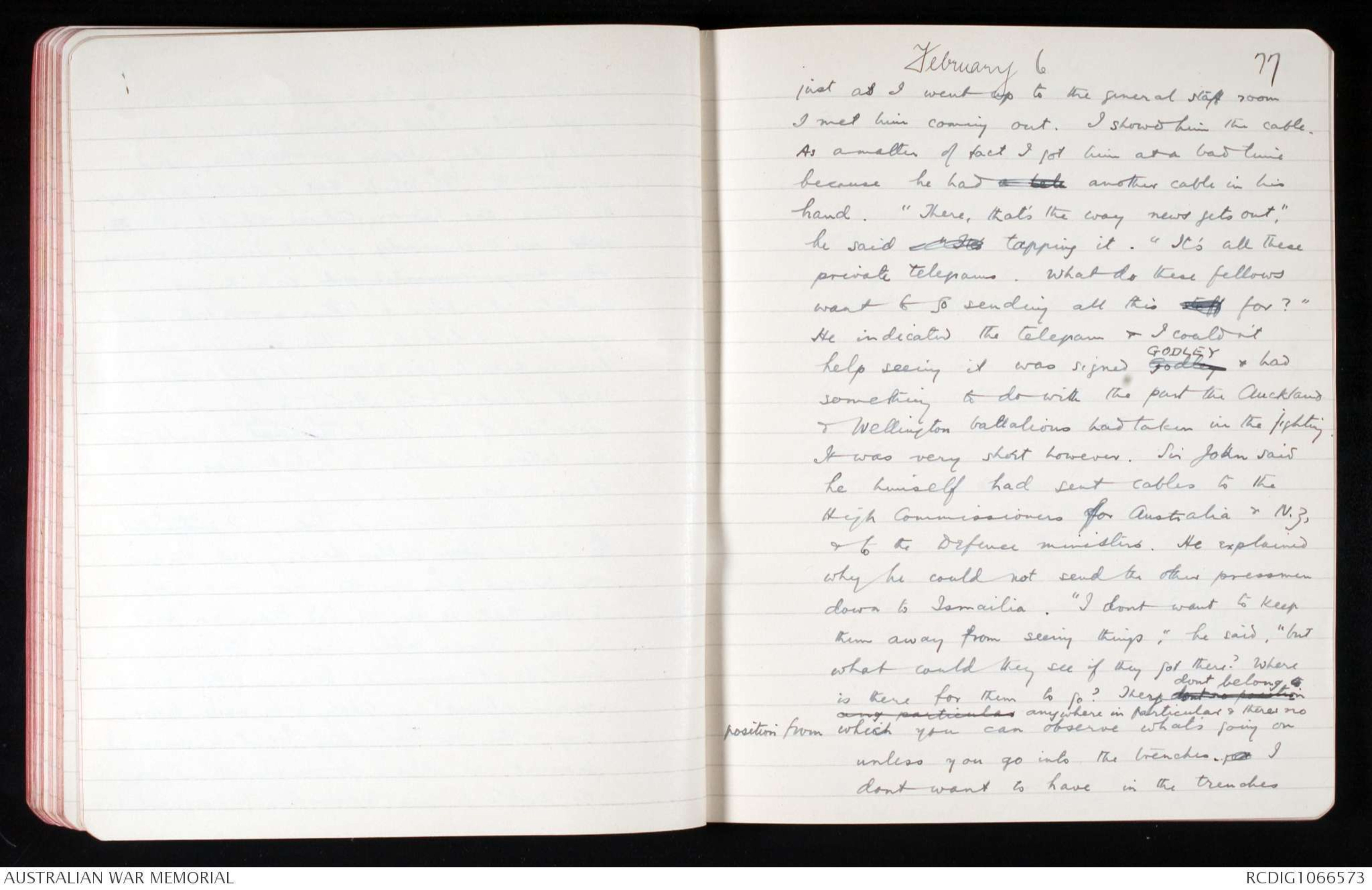
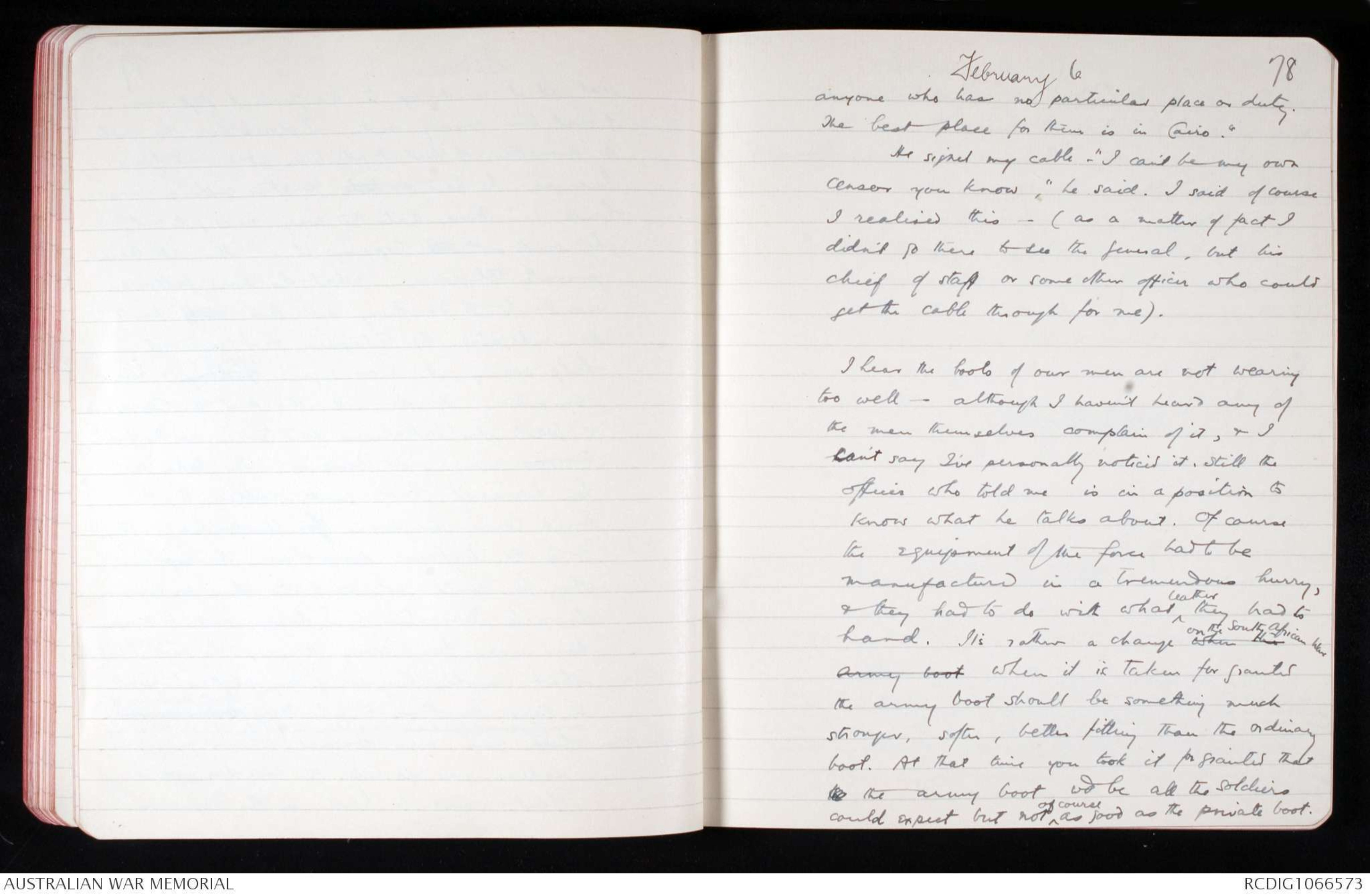
January 31 69
wharf side to catch a private who had slipped
down a rope in the bows & was making for
the town. Four others got away before the
military police got them. The ship was crowded
with men in khaki who hooted the police.
That was the first we saw of the Themistocles. The
second thing was the lifting of 4 bottles of beer
(or some stuff) in a sack through a porthole.
A ^ tiny Lancashire territorial bought the beer from
someone ^ in the crowd at the barrier at the wharf end, & coolly
loaded it into a sack which was slowly hauled
up by a strg string. I must say I admired
the ^ small Terrier's coolness. He didn't turn a
hair, but just ^ walked up in front of quite a lot of officers, put the four bottles into the
down on the wharfside one by one, & then
loaded them into the sack. They were being
hauled up when a staff officer, with the
usual red band round his cap, ran
up & tried to stop the proceedings. The only
result was that the sack was hauled in
quicker & the men on the ship above started
hooting the staff officer. About one minute
later the four bottles came back empty through
the porthole. The ships sentries on the wharf,
January 31 70supposed to in spite of the military police badges on
their arms were the slackest I ever saw.
They didn't prohibit the natives from doing
what they willed. One man walked up and down stood talking to a bunch
of Terriers waving his stick in illustration
of his yarn, & smoking his pipe without
a vestige of care whatever was going on
around him. A naval commander
who passed him asked him if he were
a sentry. He said yes. " Well then
"Well then take your pipe out of your
mouth" - said the officer. The chap took
it out; & the next instant, as soon
as the naval officer turned his back, he
ostentatiously struck a ma put it in again & struck a
match - staring straight at a couple of
Australian officers as he did so.
One couldn't help thinking that
we were in for a hot time in Cairo if
they are going to be all like this. The
Ulysses, however, the flagship, which
came in just after, sses seemed to
contain a much steadier lot. I went
January 31 71
As she came in we could see Charlie
Smith, the "Argus" representative standing
there on the promenade deck in a big
khaki helmet & a nice fitting suit of light khaki.
And to my great surprise, up on the
bridge, next to Col. Monash the com
brigadier commanding the ^ troops in this convoy, was
Maj. (now Col.) McGlynn of Sydney who
has come as brigade major. I had
not heard he was coming.
We went on board & had a
long yarn with Smith, & afterwards
with McGlynn & Col. Monash who were
exceedingly kind & made us stay to
dinner with them. Unfortunately I
had eaten something that morning or the
night before which disagreed with
me - or perhaps merely had eaten
too much of something that agreed with
me too well, as one is apt to do in
these hotels - & I was rather seedy
in consequence, only just managing
to sit the dinner out. It was just
biliousness & one was soon better.
? AE 2.
January 31. Feb 1. 72
They tell us that they had only one
warship - submarine A1 - for convoy.
The Berrima towed her. xx and she was
a constant terror to the captains - I
suppose they were afraid of running
her down at night. They had 17 ships
of which those containing the wheeler
transport go on to England. There were
3 New Zealanders - & they sailed, like
us, in 3 divisions. This time the
N. Zealanders were not painted grey.
Our ships had a big AUSTRALIA
painted in black across white
canvas front of the bridge.
Schuler & I came back from Alexandria
on Monday Feb.1. by the early train. The
first night we were there - we shared a bed
room - Instead in the middle of the night
I was wakened by the door banging in the
wind. It continued to bang - so I got
up & shut it. I also got in & In the
morning just inside the door I noticed
two letters envelopes which Peter had apparently
February 1 & 2. 73
dropped. Presently in front of the looking glass
I noticed a piastre which he had presumably
dropped also. A few minutes later he
put on his coat. I saw him feeling
in his pockets. "Confound it Bean!"
he said - & then told me his silver had
all gone. Someone had evidently been in
the room at some time during the night
& had gone through Peter's pockets;but he took about 10/- or 15/- of silver
including ^ an American dollar given to Peter by
Muriel Starr the actress - but he
missed a noteboo pocket book with
£8 or £9 in notes.
On Wednesday Tuesday Feb. 2 the whilst having
tea on the Terrace of The Continental
Hotel in Cairo I saw with several
English pressmen & Peter Schuler I
saw Col. Mackay enter the hotel.
That night about 10 he walked into
this room which I share with the A.D.Cs
at Mena. "Just my luck", he said.
"I told my batman - 'get me out a clean
February 2. 74
pair of pyjamas, a clean shirt, clean
collar, clean tie, socks, pants - I am
going to sleep in into town for once & I dont wanta a particle of sand in my clothes
for 24 hours'. And I had scarcely got
there when a message chases overtakes me
to say I was wanted here at once".
It was just his luck. He has
been working, perhaps overworking, his
brigade - & it was chosen to go to send 2 battns
the front forthwith. Headquarters got the
order at 9.30. Col. McKay got it
at 11.30. His Brigade got it at 12.30.
The brigade staff went to bed at 6 1 - ;
got up at 6; the brigad two battns.started ^ marched out of camp at 10.30. That is the way
things happen. Some N. Zealanders,
(2 battlns, I believe) & their artillery,
went out down to the Canal a few
days before. The Territorial artillery
went a few days before that - &
possibly some territorial infantry.
[shorthand]
February 2. 75
Some time ago Per Feb. 1 2 I asked Col. White if
there wd be a chance of my getting
to the Canal if there were any fighting.
He said "Oh, I shd be most
disappointed if you didn't go. I wdn't
have you miss it for anything".
When the scrap seemed imminent
I asked him whether, if our 3rd
Engineers were engaged, I might
get down & visit them. He said "I
think your best plan is to wait a little
& see if some of us go down from here".
When the 2nd Brigade moved off
he said at tea one day. "You know, Bean,
I think you ought to be down there".
I said I thought so too.
"Well you leave it to me. I'll see
what we can do", he said.
Col. White never forgets anything. You
mention a thing to him one day, & think
the next that perhaps you'd better
remind him. You always invariably find
that the thing is already half done.
On thinking it over it struck me that it
February 2 & 6. 76
was time for me to try & get my position
thought out. I had of course given it a good
deal of thinking already at odd times - so I
suggested to Col. White that I should put on paper
the ideas that had crystallised out of it all: Heaske as to censorship if I go to Ismailia, as manyother things connected with as to the proper
contents of cables & letters - & so forth. He
agreed & I did so. This paper has now
been sent on to Gen. Walker, chief of the Army Corps
staff. I asked to be allowed to discuss the
question of the limits of what within which I could write
in letters & cables; so I shall hear in a
day or two.
In the meantime, today, I submitted sent for the first telegr cable dealing with the part
our troops take in the war - a cable
to say that so far we had taken no part
in it. These cables have to be very
limited at present, because the Turkish
main attack is likely to be made before
long & the one thing they want to know at
present is where to make it. I took
the cable to Gen. Maxwell's Headquarters; &
February 6 77
just as I went up to the general staff room
I met him coming out. I showed him the cable.
As a matter of fact I got him at a bad time
because he had a tele another cable in his
hand. "There, that's the way news gets out",
he said "Its tapping it. "It's all these
private telegrams. What do these fellows
want to go sending all this stuff for?"
He indicated the telegram & I couldn't
help seeing it was signed Godley GODLEY & had
something to do with the part the Auckland
& Wellington battalions had taken in the fighting.
It was very short however. Sir John said
he himself had sent cables to the
High Commissioners for Australia & N.Z,
& to the Defence ministers. He explained
why he could not send the other pressmen
down to Ismailia. "I dont want to keep
them away from seeing things", he said, "but
what could they see if they got there? Where
is there for them to go? They dont position dont belong xany particular anywhere in particular & theres no
position from which you can observe what's going on
unless you go into the trenches. xx I
dont want to have in the trenches
February 6 78
anyone who has no particular place or duty.
The best place for them is in Cairo".
He signed my cable - "I can't be my own
censor you know", he said. I said of course
I realised this - (as a matter of fact I
didn't go there to see the General, but his
chief of staff or some other officer who could
get the cable through for me).
I hear the boots of our men are not wearing
too well - although I haven't heard any of
the men themselves complain of it, & I
can't say I've personally noticed it. Still the
officer who told me is in a position to
know what he talks about. Of course
the equipment of the force had to be
manufactured in a tremendous hurry,
& they had to do with what ^ leather they had to
hand. It's rather a change when their on the South African Wararmy boot when it is taken for granted
the army boot should be something much
stronger, softer, better fitting than the ordinary
boot. At that time you took it for granted thatxx the army boot wd be all the soldiers
could expect but not ^ of course as good as the private boot.
 Sally Hope
Sally HopeThis transcription item is now locked to you for editing. To release the lock either Save your changes or Cancel.
This lock will be automatically released after 60 minutes of inactivity.